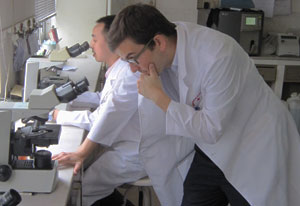Investigating syphilis in China
August 2010 | Volume 9, Issue 4
Dr Joseph Tucker
Fogarty International Clinical Research Fellow
Being granted entree into the small, exclusive network of researchers studying sexually transmitted infections in China was one of the most important benefits of Dr. Joseph Tucker's Fogarty Fellowship and allowed him to make quick progress in his syphilis project.
“In China, syphilis research is done by a fairly small group,” says Tucker, whose experienced mentors made sure he was included. “It was so rewarding to meet colleagues from around the world,” Tucker says. “The ‘syphilis in China’ international community enriched my experience and my work.”
Tucker’s American mentor is Dr. Myron Cohen, infectious diseases chief at the University of North Carolina at Chapel Hill and a world-renowned scientist who has worked in China intermittently for more than 30 years. In addition to benefiting from Cohen’s connections, Chinese mentor Dr. Xiang-Sheng Chen introduced Tucker to experts from around the world and encouraged him to become involved in syphilis screening policy research.

Photo courtesy of Dr. Joe Tucker
Being granted entree into the exclusive network of
researchers studying infectious diseases inChina allowed
Fogarty Fellow Dr. Joe Tucker to make quick progress in his
syphilis project.
The goal of Tucker’s project, which has also been funded by the NIH Office of AIDS Research and the American Recovery and Reinvestment Act, is to increase syphilis and HIV screening. He evaluates patient and physician determinants of testing as the director of the Plum Blossom Project, so named because “plum blossom” is the English translation of the Mandarin term for syphilis. The program provides free rapid testing for syphilis and HIV in seven clinics in South China. The process is easy, comfortable and inexpensive: no lab equipment is necessary.
“Syphilis was virtually eliminated in China 50 years ago,” says Tucker, “Now, it is growing at a rate faster than in any other country since the introduction of penicillin. Today, one baby is born every hour with congenital syphilis, which can cause irreversible birth defects.” Having syphilis also increases the risk of acquiring and transmitting HIV.
A mark of Tucker’s success is his recent NIH Award, a Fogarty International Research Scientist Development Award (IRSDA) that provides three to five years of financial support for intensive, mentored career development in preparation for research independence.
Tucker’s lab in Nanjing is a long way from Appalachia where he grew up. His mother taught tai chi, Tucker’s first exposure to anything Chinese. At Swarthmore College, he signed up for Mandarin and earned a master’s in East Asian Studies. Through coursework and international news, Tucker became interested in China’s evolution.
“The long-established social structure had become completely unhinged by China’s new status as a global economic powerhouse,” he says. “One side effect of the changes was a thriving sex industry, born of an imbalance of Chinese businessmen with money and young women without. This led to a rise in sexually transmitted infectious diseases in one population after another.”
During his fellowship, Tucker attended many conferences and occasionally presented. “Whenever I speak Mandarin there are surprised faces in the audience. My colleague Dr. Yang Li-Gang pushed me into translating at a national conference. The speaker’s slides of stick figures’ nitty gritty practices were uncomfortable to describe. I finally stopped and admitted I was having trouble but told the audience I had to get past my uneasiness - just as we all have to when we interview patients, and they have to overcome anxiety to tell us the truth about their sexual health.”
More Information
To view Adobe PDF files,
download current, free accessible plug-ins from Adobe's website.
Related Fogarty Programs
Related World Regions / Countries